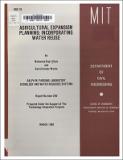Agricultural Expansion Planning: Incorporating Water Reuse
Author(s)
Allam, Mohamed Nasr; Marks, David Hunter
Download10663085.pdf (6.687Mb)
Metadata
Show full item recordAbstract
A mathematical model has been built to guide decisions required for agricultural expansion planning. Of particular interest is the case when some, or all, of the irrigation sources available have saline water. These decisions generally are quantities and locations of all resource inputs, mixing ratio between different waters, if mixing is possible, irrigation network design, required enlargement in the existing irrigation system, and crop pattern distribution in the new lands. These decisions are based on the maximum net benefit criterion and are carried out in a mathematical optimization framework. A comprehensive study of the use of this model in a large scale planning problem has been done. This case is based upon the proposed agricultural expansion in the-Nile Delta and the Sinai in Egypt. The available irrigation sources 'in-these regions are fresh and saline waters from the River Nile, and from the drains of the existing cultivated lands, respectively. Different alternative schemes for irrigating the new lands have been obtained. An economic approach for enabling the decision makers to analyze the different alternatives has been presented. In addition, the equity concerns in scheduling and cost allocation have been discussed.
Description
Prepared under the support of the Technology Adaptation Program.
Date issued
1982-03Publisher
Cambridge, Mass. : Ralph M. Parsons Laboratory, Hydrology and Water Resource Systems, Massachusetts Institute of Technology, Dept. of Civil Engineering
Other identifiers
269
Series/Report no.
R (Massachusetts Institute of Technology. Department of Civil Engineering) ; 82-10.Report (Ralph M. Parsons Laboratory for Water Resources and Hydrodynamics) ; 269.TAP report ; 82-2